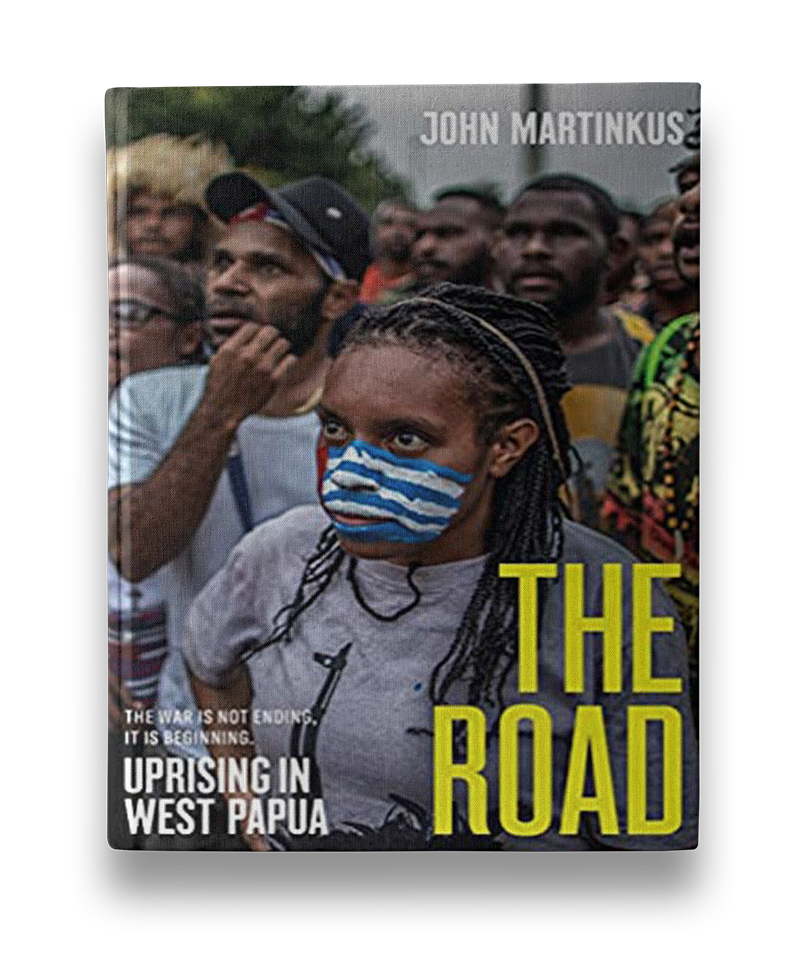John Martinkus. The Road: Uprising in West Papua. Carlton: Black Inc., 2020. 128 pp. ISBN 978-1760642426.
This is one of the most disturbing books I have read in a while. I say that as someone very familiar with the terrible war being waged on the Uyghur people by the Chinese government. Author and investigative reporter John Martinkus, who has seen ethnic conflicts in places like Iraq, Burma and Afghanistan, writes “never have I seen a people more systematically oppressed and isolated than the West Papuans, by the Indonesian military and intelligence services” (p. 109).
In 1961 the Dutch colonizers sought to hand over the western half of the island of New Guinea to the UN as a transition towards independence for the West Papuan people. When the newly forming nation of Indonesia threatened to side with the Soviets, Western nations including Australia, allowed Indonesia to take over the former Dutch territory. Just as with East Timor, the West Papuans were shafted.
Notwithstanding the sham “vote for integration” with Indonesia in 1969, the Papuans have by and large resisted Indonesian rule from the start, sometimes violently; and they have been made to pay a high price for doing so. In this short book (I read it in one sitting) Martinkus outlines the history of killings, torture, bombing, forced relocations and mass displacements of people, and plundering of their resources – with the Indonesian military running protection for Western mining companies. Knowing that the world has basically given it a free hand, the Indonesian government has tried to fob the Papuans off with promises of development while swamping them with millions of Javanese under the transmigration programme. And when that doesn’t make them knuckle under, it cracks down brutally.
As Martinkus sums it up, the Indonesians “have tried to create a society that is a mirror image of their own in a land they occupied against the wishes of the local population, and the local people have never forgotten or forgiven that take over” (p. 28).
I’m particularly disturbed by the story because it reminds me of the oppression of the Uyghurs, whose plight has at least become relatively widely publicised. I’m disturbed because it reminds me of what European colonisers have done to the indigenous people of Australia. I’m disturbed because Australia is complicit in silencing and covering up the current outrages. I’m disturbed because this feels so close to home – I grew up in Papua New Guinea, the independent country to which many West Papuans have fled and where some freedom fighters have found safe haven. I’m disturbed because Indonesia is one of our closest neighbors and a country Australia must have a closer relationship with. Yet can the relationship survive another Timor Leste?
It is hard to see where the hope is in this. Martinkus mentions a new generation of Papuans who are better educated and know their rights. And younger Indonesians who are horrified when they learn what their government and military have been doing in West Papua. Surely this is a key factor in any future improvements to the situation. Martinkus also notes the role that missionaries and churches have played in both exposing atrocities and empowering the West Papuan people. Let us pray that West Papuan Christians may take a leading role in bringing about that substantial healing that can take place in this age as well as in preparing their people for the age to come.
